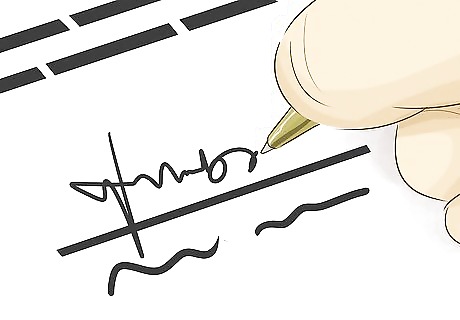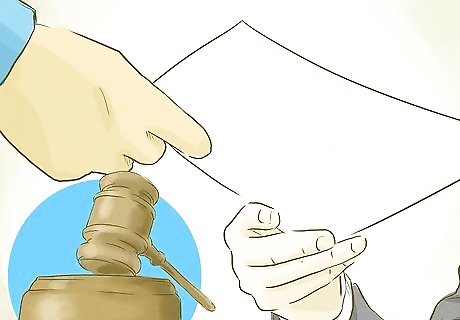
views
Preparing to File

Determine if Maryland Courts have jurisdiction for a custody case. Jurisdiction for a child custody decision lies in the state where the child resides. If a parent has recently removed the child from the state of Maryland, and the parties were married or divorced in Maryland, the state’s Courts retain jurisdiction, as long as the parent who removed the children from the state can be located and notified of the custody action.

Determine which court should hear your custody action. If you already have a custody order you should file for custody in the court that issued the order. If you do not already have a custody order, you should file in the county court in the county where the child resides or last resided.

Decide if you will file alone or if your children’s other parent will join in the action. Talk to your children’s other parent, and if you can come to an agreement on custody, filing together can make the process go much more quickly. However, if you find that cannot come to an agreement, you may want to file alone.
Filing Your Petition

Obtain the proper custody form. The Maryland Courts provide free forms for divorce, an establishment of custody, and modification of custody. You may download the forms by visiting the Court’s Family Law Forms section at http://www.courts.state.md.us/family/formsindex.html#domesticrelations. The Court provides four different forms, or sets of forms, that can be used for child custody cases or cases which involve child custody. Those are: A complaint for custody may be used by either parent, or a third party, in order to request a custody order where one has not yet been issued in a divorce or establishment of paternity. A parent or third party who wishes to modify the current custody order should use the Petition to Modify Custody form. A parent who has minor children and wishes to divorce the child(ren)’s other parent, may ask for custody in their Complaint for Absolute Divorce A limited divorce, or legal separation, may be sought by parties who are unsure if they want to divorce. It allows the parties to begin living separately and dividing property, while remaining married, in case their differences cannot be resolved. The Court may decide issues such as custody and child support during a limited divorce or the parties can agree on such issues and file their written agreement with the Court.

Obtain other forms, as necessary. Besides the Petition for custody or divorce, a party filing a lawsuit for custody may also need to file other forms, such as a/an: Financial Statement. Divorcing parties will likely need to fill out the long form Financial Statement] If you are unsure if you need to file a form, you can ask the Clerk. Domestic Case Information Report. This should be filed with each petition for divorce or to establish or modify custody. Child Support Guideline Worksheets. If you are asking for sole physical custody, you may need to complete Child Support Guideline Worksheet A, and if you are asking for shared physical custody, Child Support Guideline Worksheet B. Certificate or Affidavit of Service. This simply states that you served your spouse with the require documents. Request for Hearing or Proceeding. If you are filing your custody action alone and the child’s other parent does not agree with you on all issues, you may need to schedule a hearing by filing a Request for Hearing or Proceeding.

Complete your forms. When completing your forms, type or print neatly in blue or black ink. You can find instruction for most custody and family law forms on the, under ‘Instructions’. If you need help, the Clerk of Courts in the County where you will file your suit may be able to provide you with a limited amount of assistance. However, some questions may be considered asking for legal advice, and the Clerk will not be able to answer those questions. If you need assistance that the Clerk of Courts cannot provide, check your county Court’s website for free and low-cost legal aid. You can locate your Court’s website at http://www.courts.state.md.us/family/localcontacts.html

Prepare your forms for filing. Once complete, you will need to prepare your forms for filing with the Court. To do this: Print and sign all appropriate forms. Some forms, like the Certificate or Affidavit of Service, cannot be signed or mailed until after you have filed for custody and served your child’s other parent a copy of the Complaint or Petition. If you are unsure when to file a specific form, read the instructions, and/or ask the Clerk when the Court will need it. Call the Clerk of Courts in the county where you will file, and ask how many copies of each form they need, what your filing fee will be, and what forms of payment are accepted. Make the appropriate number of copies. If you do not have a copy machine, check with your local library and/or post office for copy services. Most libraries will make copies for between $.10 and $.25 a page. Staple together any forms that are more than one page long. Be sure not to staple two different forms together. Each form should have a case caption at the top of the first page. The case caption is the part that lists the state, county, and court, the parties, and states the case or cause number.

File your forms. Take your prepared forms and filing fee to the County Clerk’s Office for filing with the Court. The fee will be at least $300; if you cannot afford that, then ask the judge for a waiver. The Clerk will assist you with stamping your forms and filing them. Be sure that you get a stamped copy of each form that you file, so you have a record of what was filed and when.

Serve your children’s other parent. After filing you forms with the Court, you will need to make sure that your child’s other parent, or his or her attorney, gets a copy of each form that you filed. You can do this by mailing the copies via Certified Mail or by hiring the county Sheriff or a process server to serve the copies personally. If you are having trouble locating the other parent, then check out the information at Serve-Court-Papers for more details.


















Comments
0 comment